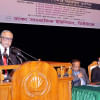Everything OK

Mohammed Farashuddin firmly believes it was wise to drop the time scale and selection grade from the Eighth National Pay Scale.
The head of the Pay and Services Commission, however, said that more incentives could be given to civil servants.
“I strongly stand by the commission's recommendations on the selection grade and time scale. The alternative [annual increment] to those has been approved by the government. It should be continued, perhaps with more incentives,” he told The Daily Star in an interview on Thursday.
He said the time scale and selection grade were imperfect, incomplete and riddled with irregularities.
Many public servants, who took the facilities, didn't get those on their merits, he said.
“As a result, thousands of litigations have been filed, and the government has to remain busy with those.”
The commission looked for alternatives, and suggested annual increment on compounded basis. Even if a public employee does not get promoted, his salary will double after 15 years, said Farashuddin, also former Bangladesh Bank governor.
He, however, said the government could raise the compound annual increment to six percent from five percent.
The commission is just an advisory body. Only the government can implement the recommendations, said the commission chief.
Farashuddin said he was happy that the government has approved more than 90 percent of the commission's recommendations and is implementing it.
Public servants have to be paid well so they don't need to worry about their financial problems every day, he said.
On public university teachers' resentment at the cancellation of the time scale and selection grade, he said the seventh pay scale had placed professors in Grade-III but the eighth suggests they should get Grade-II and there should be a well defined policy and available posts for them to get Grade-I.
He, however, said the existing system for their promotion from lecturers to professors should be structured well.
About the debate over the entry of cadres and non-cadres into service, he said the commission recommended 15 or 16 scales instead of 20 for simplicity.
According to the new pay scale, BCS cadres will enter public service at grade-VIII while non-cadre class-I officers will do so at grade-IX.
Referring to the central bank employees' demand, Farashuddin said he tried to help get them a separate pay scale when he was BB governor.
Central bank employees have separate pay scale in almost all countries, he added.
The commission recommended that salaries and facilities for employees of all government institutions must be within a unified structure. The only exception will be those institutions that are self-financed, and Bangladesh Bank is one such example, he said.
“However, central bank employees should look at their salary structure. If they come under the national pay scale, most of them will be big losers. A lot of posts have been created at the bank and the salaries for those are a lot higher than those under the national pay scale.”
He also recommended a separate arrangement for sections of professionals such as scientists and agriculturalists who make significant contributions.
Farashuddin, however, said it was not the commission's responsibility to say who should belong to what grades. Its job was limited to making recommendations on salaries only.

 For all latest news, follow The Daily Star's Google News channel.
For all latest news, follow The Daily Star's Google News channel. 








Comments